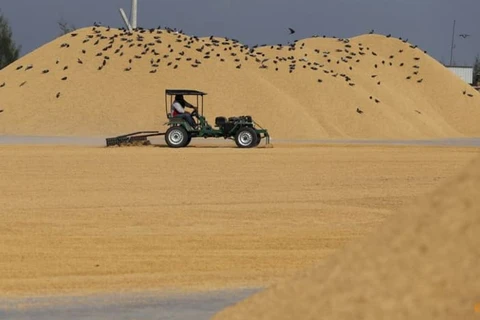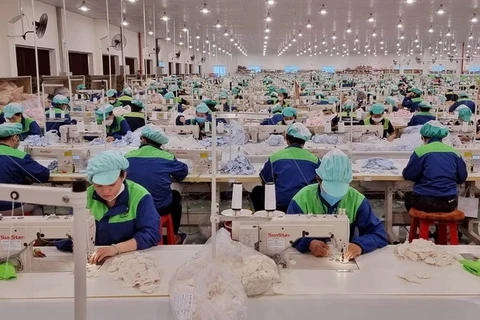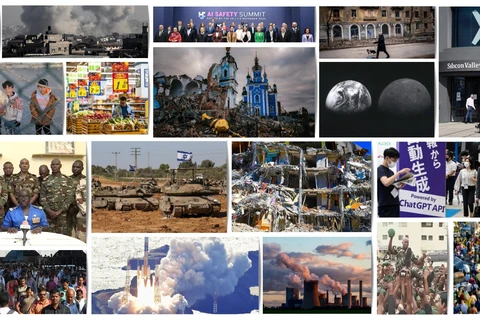1. Global economic recovery slows down
The world’s leading financial institutions estimated that this year’s global economic growth will be lower than the increase of 3.3 - 3,5% in 2022 as a result of the “financial earthquake” triggered by the US and Swiss banking crisis, the energy crisis, and the conflicts in Ukraine and the Middle East. The central banks of many countries had to consider hiking interest rates to curb inflation or stopping rate increases to aid economic recovery,
2. “Earthquake” on global financial market
In just three days, from March 10 to 12, Silicon Valley Bank and Signature Bank, two major banks of the US, had to shut down due to liquidity losses when depositors withdrew large sums of money. On May 1, First Republic Bank became the third in the US to go bankrupt in nearly two months. In Europe, Credit Suisse, the second biggest bank of Sweden, also faced the risk of collapse. Timely financial assistance packages from governments and central banks of countries prevented a widespread banking crisis that might lead to an economic depression.
3. Rice export restrictions, climate change threaten food security
On July 20, India, the world’s biggest rice exporter, suddenly banned the export of non-basmati white rice. The unexpected nosedive in rice supply from India, climate change impacts, and geo-political conflicts boosted prices of Thai rice – an Asian benchmark, to a 15-year high and encouraged stockpiling in many countries. These factors affected purchasing countries, especially poor ones in Asia and the south of the Sahara. The UK Global Food Security Summit outlined some solutions towards a sustainable and climate-adaptive food system.
4. COP28 reaches historic deal to phase out fossil fuels
The 28th Conference of the Parties to the United Nations Framework Convention on Climate Change (COP28) made a big breakthrough on December 13 when mentioning the “transition away from fossil fuels” in a joint statement for the first time. After almost three decades the UN climate change conference was held, countries reached consensus on gradually transitioning away from fossil fuels so as to reach the target of net zero emissions by 2050.
5. Generative AI applications become year’s phenomenon
Generative artificial intelligence (AI) has become one of the booming technological trends in 2023 after ChatGPT caused a “global fever” with 100 million users in late January, just two months after its debut. Generative AI has enjoyed a year of gigantic development of functions. This breakthrough technology is revolutionising the ways economic sectors operate, strongly changing the job market, and shaping the future of work.
6. World gold prices break all-time highs
World gold prices on the December 4 trading session hit a record of 2,152.3 USD per ounce, and there haven’t been any signs showing the upward trend will stop. The continuous surge is attributed to escalating geo-political conflicts and high inflation, turning gold into a safe-haven asset. Central banks have purchased an unprecedentedly big amount of gold. The capital inflows into gold have affected markets worldwide, caused declines on stock markets, and prolonged the depreciation of the US dollar.
On July 20, India, the world’s biggest rice exporter, suddenly banned the export of non-basmati white rice. The unexpected nosedive in rice supply from India, climate change impacts, and geo-political conflicts boosted prices of Thai rice – an Asian benchmark, to a 15-year high and encouraged stockpiling in many countries. These factors affected purchasing countries, especially poor ones in Asia and the south of the Sahara. The UK Global Food Security Summit outlined some solutions towards a sustainable and climate-adaptive food system.
4. COP28 reaches historic deal to phase out fossil fuels
The 28th Conference of the Parties to the United Nations Framework Convention on Climate Change (COP28) made a big breakthrough on December 13 when mentioning the “transition away from fossil fuels” in a joint statement for the first time. After almost three decades the UN climate change conference was held, countries reached consensus on gradually transitioning away from fossil fuels so as to reach the target of net zero emissions by 2050.
5. Generative AI applications become year’s phenomenon
Generative artificial intelligence (AI) has become one of the booming technological trends in 2023 after ChatGPT caused a “global fever” with 100 million users in late January, just two months after its debut. Generative AI has enjoyed a year of gigantic development of functions. This breakthrough technology is revolutionising the ways economic sectors operate, strongly changing the job market, and shaping the future of work.
6. World gold prices break all-time highs
World gold prices on the December 4 trading session hit a record of 2,152.3 USD per ounce, and there haven’t been any signs showing the upward trend will stop. The continuous surge is attributed to escalating geo-political conflicts and high inflation, turning gold into a safe-haven asset. Central banks have purchased an unprecedentedly big amount of gold. The capital inflows into gold have affected markets worldwide, caused declines on stock markets, and prolonged the depreciation of the US dollar.
7. EU imposes carbon tariffs on imports
On October 1, the European Union (EU) began the trial phase of the Carbon Border Adjustment Mechanism (CBAM), the first step to impose tariffs on imports from the countries failing to meet environmental standards from 2024. The CBAM is considered an effective tool for encouraging non-European businesses to reduce carbon emissions. Those businesses will loss their competitive edge if they do not cut emissions during the production process to meet the EU’s environmental regulations.
8. Central banks put the brakes on interest rate hikes
On June 14, the US Federal Reserve (Fed) stopped raising interest rates after 10 consecutive hikes from March 2022. On October 26, the European Central Bank (ECB) also ended its streak of 10 interest rate rises. More positive signals from the job market and inflation were the first grounds for Fed, ECB, and other leading central banks to pause rate increases. The move has supported countries to prevent their currencies from depreciating sharply compared to the US dollar and control foreign-currency debts.
9. EU, US issue unprecedented rules to protect cyberspace for users
On August 25, the EU issued two pieces of legislation to control cyber technology, namely the Digital Services Act and Digital Markets Act. On October 30, the US President signed the first executive order on AI to prevent risks to national security and economy. This was the first time in history the EU and the US had used rules to tighten control over online content and activities of technology companies. Those legal documents force the companies to apply new methods to ensure safety in cyberspace.
10. Risk of international transportation crisis posed by attacks on arterial shipping route through Red Sea
Attacks by Yemen’s Houthi force against ships in the Red Sea since December 3 has disrupted the transportation of oil and cargo between Asia and Europe. Shipping companies have diverted over 30 billion USD worth of cargo away from the Red Sea, which is an arterial shipping route for about 12% of global trade and also a gateway to the Suez Canal. The attacks have posed a risk of a sea transportation crisis and supply chain disruptions, which may boost oil prices, shipping costs, and inflation./.
On October 1, the European Union (EU) began the trial phase of the Carbon Border Adjustment Mechanism (CBAM), the first step to impose tariffs on imports from the countries failing to meet environmental standards from 2024. The CBAM is considered an effective tool for encouraging non-European businesses to reduce carbon emissions. Those businesses will loss their competitive edge if they do not cut emissions during the production process to meet the EU’s environmental regulations.
8. Central banks put the brakes on interest rate hikes
On June 14, the US Federal Reserve (Fed) stopped raising interest rates after 10 consecutive hikes from March 2022. On October 26, the European Central Bank (ECB) also ended its streak of 10 interest rate rises. More positive signals from the job market and inflation were the first grounds for Fed, ECB, and other leading central banks to pause rate increases. The move has supported countries to prevent their currencies from depreciating sharply compared to the US dollar and control foreign-currency debts.
9. EU, US issue unprecedented rules to protect cyberspace for users
On August 25, the EU issued two pieces of legislation to control cyber technology, namely the Digital Services Act and Digital Markets Act. On October 30, the US President signed the first executive order on AI to prevent risks to national security and economy. This was the first time in history the EU and the US had used rules to tighten control over online content and activities of technology companies. Those legal documents force the companies to apply new methods to ensure safety in cyberspace.
10. Risk of international transportation crisis posed by attacks on arterial shipping route through Red Sea
Attacks by Yemen’s Houthi force against ships in the Red Sea since December 3 has disrupted the transportation of oil and cargo between Asia and Europe. Shipping companies have diverted over 30 billion USD worth of cargo away from the Red Sea, which is an arterial shipping route for about 12% of global trade and also a gateway to the Suez Canal. The attacks have posed a risk of a sea transportation crisis and supply chain disruptions, which may boost oil prices, shipping costs, and inflation./.
VNA




























